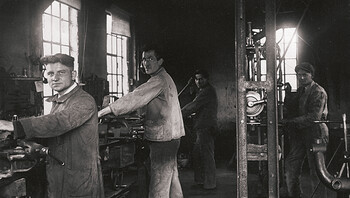100 years
Marbach Group
6. February 2023
100 years of Marbach (Part 1) 1923 - 1927: The founding years.
We celebrate our 100th anniversary in 2023. Such a long company history cannot be taken for granted in Germany, where less than 2% of companies have reached this milestone. But how did Marbach manage to grow from a small craftsman's business to a globally operating group of companies with 1,600 employees worldwide?
To be successful as a company and to endure for such a long time, one thing above all is needed: stamina. Also, tremendous dedication and the absolute will to succeed. The 25-year-old Karl Marbach Senior, possessed all of these qualities already in the founding years of the Marbach company. And indeed, he had to. Because in the 1920s, the conditions for founding a company were not ideal. Nevertheless, on July 16, 1923 – only two days after his wedding to Marie (née Bühler) from Gerstetten – Karl Marbach Senior, who came from the small community of Unterheinriet, laid the foundation for the Marbach Group.
Together with two partners, the trained locksmith and mechanic founded a mechanical workshop in Heilbronn's Köpfstrasse. In addition to repairs of all kinds, the young company had a diverse product range: from children's carousels to turned and milled parts, washing presses to garage doors. The most important products, however, were attaching manual top knives for the regional leather industry, because Heilbronn was a stronghold of the industry at that time.
However, it was not possible to predict at the time that the company would one day survive to be 100 years old. Indeed, quite the opposite was more likely: the company was founded during the crisis years, there was economic hardship due to reparations from the First World War, the occupation of the Ruhr region and inflation. The earning possibilities for three people, who each owned the workshop in equal shares, were therefore very limited. And as a result, business operations had to be suspended within the first year of operation. During this time, Karl Marbach Senior kept his head above water with occasional jobs – cleaning steam locomotives for example.
In 1924, Karl Marbach Senior re-started the business, but this time alone – his two co-founders did not want to join again. He then moved the workshop to the Fügerstrasse in Heilbronn. To begin with, he rented the building from the city and later bought it. But due to the world economic crisis, there were fewer and fewer customers from the shoe industry. Yet Karl Marbach Senior did not let this get him down.
As luck would have it, an acquaintance of Marbach, the owner of the storefront advertising factory Willi Nupnau, was looking for a regional supplier for steel rule dies. Nupnau's previous supplier was located in Berlin and thus too far away to be able to deliver quickly and at low cost. Willi Nupnau used the steel rule dies to die-cut colored letters from paper, paperboard and cardboard for window shop decorations, among other things. Nupnau visited Karl Marbach Senior with a sample wooden tool under his arm and asked if Marbach could produce something like that. That was no problem for Karl Marbach Senior. From this moment on, he started to focus on the production of steel rule dies, and this decision would turn out to have far reaching effects.
Wood for the steel rule dies was easily available from carpenter suppliers, the bigger challenge were the cutting rules. After some searching, Karl Marbach Senior found what he was looking for in a junkyard: he found springs from gramophones took them and sharpened them. So, he had cutting rules for his tools. With this new product, Marbach now targeted a new group of customers from the paper converting and advertising material industry. Later, the demand for folding boxes by the Knorr company created yet more demand.
Karl Marbach Senior managed to successfully lead the company out of the world economic crisis with a new product and new customers. He thus laid the foundation for the future success of the Marbach Group. Then on March 30, 1927: Karl Marbach and Marie Marbach (née Bühler) had a son, Karl Marbach Junior in Heilbronn. He would later transform the company into a worldwide success. But before that would happen, there would be more difficult years for the young company: another world crisis was about to begin with the Second World War.
How Marbach was able to overcome this crisis as well, is the subject of the second part of this series: "100 years of Marbach. 1939 - 1945: The Years of War."

